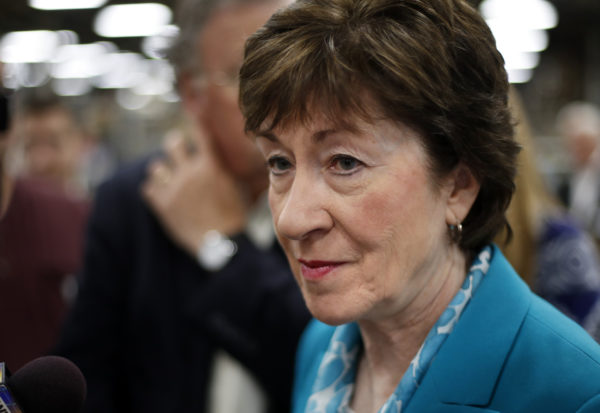
U.S. Sen. Susan Collins says she is poised to announce by next week whether she will run for governor in 2018.
Her extended “to run or not to run” drama continues to draw breathless scrutiny in Maine and national political circles.
Because of Republicans’ razor-thin majority in the Senate, Collins’ influence has grown since President Donald Trump took office. As a rare congressional moderate, Collins has been a key vote in blocking major elements of Trump’s agenda that reflects what she sees as policy or process flaws, most notably efforts to repeal and replace the Affordable Care Act. She has openly criticized Trump, dating back to August 2016 when she announced she would not vote for him for president.
In Maine, polls for years have shown her to be the state’s most popular politician. With support from voters in both parties, it is generally accepted that Collins could trounce opponents in the gubernatorial general election — if she could survive a more partisan June Republican primary and attacks from the more conservative wing of her party.
But have her votes on some of Trump’s nominees, his immigration policy attempts and the health care law changed how Collins is seen in the part of Maine that gave Trump an electoral vote last year?
Of approximately three dozen Mainers from the 2nd Congressional District interviewed by the Bangor Daily News in late September, a clear majority identified as Collins supporters, whether they were Republicans, Democrats or independents.
“I’ve always been a big supporter of her,” said Josh Kovach, a 23-year-old Trump voter from Bangor. “I was not super wild about her secretary of education decision, but I have always stood behind her. She is a very powerful woman and has really put Maine on the map.”
In February, Collins was one of only two Senate Republicans who opposed Trump’s nomination of Betsy DeVos for education secretary, who was confirmed anyway.
Jean Bourg of Unity, who voted for Hillary Clinton, is another Collins supporter. She said she appreciates Collins’ opposition against two recent efforts to repeal the Affordable Care Act.
“She’s saved us twice on that,” Bourg said. “I believe in crossing over. If you don’t cross over, then you’re just a party hack.”
Bourg said depending on the identity of the other candidates, she would likely support Collins in a gubernatorial election.
Caribou resident Janice Pinette, a Clinton voter, said she’s “been very pleased with what I’ve seen coming from her,” but wishes Collins would remain in the Senate.
“There are plenty of other people running for governor and people respect her in the Senate,” Pinette said.
Support for Collins has not been unwavering, though. Todd Rogers of Passadumkeag, a Republican, said he has been a Collins supporter in the past but that her recent actions, particularly the health care votes, could change things.
“As a Republican I’ll have to weigh that in the next election,” he said. “It’s not totally fatal. I’m not saying she has to vote with the party every time.”
Other Republicans who have voted for Collins in the past, such as Val Borg of central Maine, have changed their minds based on the most recent Affordable Care Act repeal bill.
“Many people have washed their hands of her because of that vote,” he said.
One of those people is Gov. Paul LePage. Once allies as the most prominent elected Republicans in Maine, LePage and Collins now seem clearly divided by Trump,
After the 2016 election, he proclaimed her “ done in Maine” over her opposition to Trump. Last month, LePage teamed up with Vice President Mike Pence to pressure Collins to support the Graham-Cassidy health care bill — which she didn’t. For months, he has castigated her at party gatherings and during radio appearances. Once again, this week’s gubernatorial radio address lambastes her for opposing the latest Affordable Care Act repeal effort championed by Trump.
“Sen. Collins is so busy trying to stop President Trump’s agenda on the national stage, she is out of touch with her own state,” LePage said in the radio address. “She puts other states ahead of the people she is supposed to represent.”
While LePage has succeeded often in rallying Republicans to his causes and winning political conflicts with Democrats, he seems to have met his match in Collins, who continues to be able to tap a much broader base of support in Maine.







